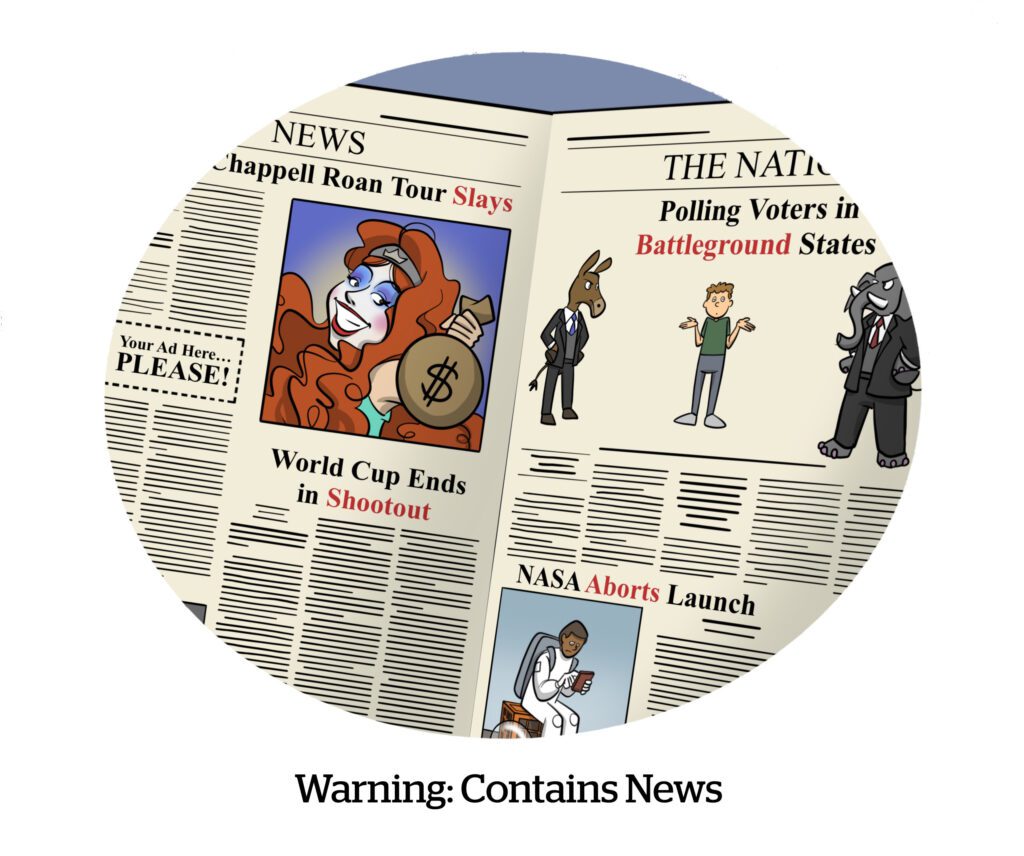The FTC’s consent order for the impending OMG/IPG megamerger prohibits the two agency holding companies from blocking ad spend to publishers on the basis of politics and ideology.
The order is part of a wider effort by Republicans to dismantle what the FTC and members of Congress say is an ad industry conspiracy to demonetize conservative news sites.
But in reality, agency decisions to block certain websites from ad campaigns have nothing to do with political ideology, said Vanessa Otero, founder and CEO of Ad Fontes Media. Otero has her reason to cast doubt on the FTC’s order. Her media rating organization is being investigated by the FTC related to the alleged conspiracy against conservative news.
Rather than being based on politics, decisions to block sites have to do with whether sites are publishing misinformation or hate speech, Otero said. Which means the FTC order is “toothless,” she said, because it prohibits a practice that doesn’t exist.
Meanwhile, the FTC order only prohibits agencies from deciding, on behalf of brand clients, to block ad spend to a website based on the site’s politics – but it doesn’t prohibit brands themselves from directing their agency partners to block sites over politics.
Given that brands can still block publishers on a political basis, the FTC order “has as many holes as a piece of Swiss cheese,” said Jared Belsky, CEO and co-founder of Acadia, an independent ad agency.
The realities of media buying
In practice, Otero said, the FTC order is not enforceable unless there’s a paper trail in which a media buyer at OMG/IPG explicitly says to a brand something like, “We recommend you block this site because they’re Republicans.”
But a paper trail of any kind typically doesn’t exist for most media-buying decisions, Belsky said.
Based on the wording of the order, Otero said, it should still be fair game for agencies to block publishers in order to avoid misinformation, hate speech or unfavorable content adjacencies.
Ad Fontes’s practice of placing media outlets on an ideological bias chart should also be protected, she said, because it’s just one factor, alongside the outlet’s trustworthiness, that agencies weigh in spending decisions.
And, she added, even if agencies were making spending decisions based on publishers’ politics, they would be within their First Amendment rights to do so.
The Supreme Court, in its Citizens United decision, “expressly ruled that corporations have the right to speech, that their money is speech, and that they can use it for political speech,” Otero said. And the Supreme Court’s ruling in the Masterpiece Cakeshop case supports the idea that the government “cannot make a holdco do business with somebody that they disagree with politically,” she said.
Republican FTC Chair Andrew Ferguson claimed the consent order “does not limit either advertisers’ or marketing companies’ constitutionally protected right to free speech” in a statement announcing the deal.
But “prohibiting the carrying out or enactment of editorial discretion absolutely limits First Amendment activity,” Ari Cohn, tech policy lead counsel for the Foundation for Individual Rights and Expression, recently told Reason.
And one left-leaning media watchdog that has come under FTC investigation, Media Matters, is suing the commission, alleging that it “faces an ongoing campaign of retribution for exercising its First Amendment rights.”
Free speech rights aside, Belsky said, the FTC order seems to focus on programmatic advertising and the use of brand safety blocklists. These practices typically only come into play when directing a brand’s discretionary spending, which makes up a small sliver of overall budgets, he said.
Nowadays, Belsky said, about half of a brand’s budget goes to performance campaigns, which are “very democratized by data.” About a quarter goes to upfront deals, and much of the remainder goes to retail media, which is likewise “democratized by ROAS.” That leaves about 5% of the budget for discretionary spending and picking which sites to buy programmatically, he said.
Long-simmering grievances
Whether the FTC consent order changes how media buying works in practice is almost beside the point, though. Conservative media has long had a bone to pick with the brand safety industry, Otero said.
The tension between conservative media and brand safety has a long history. Longer even than Elon Musk’s legal spat with the World Federation of Advertisers (WFA), which saw Musk sue the WFA’s GARM brand safety initiative out of existence last year.
Partisan media watchdogs, like left-leaning Sleeping Giants, have long touted their effectiveness at getting brands to drop ad support for conservative media outlets and influencers that publish misinformation or promote hate speech.
For example, Sleeping Giants and other watchdogs famously got conservative news site Breitbart removed from 4,000 brands’ media plans in the late 2010s. At the time, Breitbart was headed by Steve Bannon, who served as a key advisor to President Donald Trump during his first term and remains a major figure in conservative media.
Another media watchdog, Check My Ads, had a long-simmering public feud with conservative influencer Dan Bongino that contributed to Bongino being booted from YouTube and Google AdSense. That would be the same Dan Bongino currently serving as Deputy Director of the FBI.
All of these episodes, among others, resulted in the House Judiciary Committee, led by Republican Congressman Jim Jordan, launching investigations and holding hearings related to ad industry brand safety practices last year. Ad agency GroupM’s internal deliberations over blocking Breitbart featured prominently in these hearings, as well as testimony from Ben Shapiro, founder of conservative news site The Daily Wire.
While some partisan media watchdogs may have deliberately targeted conservative news outlets in the past, Otero said, now non-partisan ad agencies, media ratings orgs and ad tech vendors are being dragged into conservative media’s feud with brand safety. The FTC’s consent order is just the latest example of a growing push to demonize all brand safety efforts as politically motivated, she said.
But it’s a misguided crusade, Otero said. Conservative news sites are not the only ones that get demonetized by brand safety blocking. In fact, she said, conservative news tends to do well compared to other news outlets. For example, Fox News outearns CNN and MSNBC, and The Daily Wire has parlayed its yearslong run as one of the top news outlets on Facebook into a $200 million a year business.
A win/win
But reality aside, there are some practical reasons why the consent order is a win/win for both OMG/IPG and Republican politicians.
The FTC order will do little to change how ad agencies operate, Belsky said. Therefore, OMG and IPG likely saw no harm in accepting the order if it meant their merger – which would make the combined company the largest agency holdco by revenue – would be approved by the government.
And OMG/IPG agreeing to adhere to the order also helps the FTC’s three remaining Republican-appointed commissioners position the deal as confirmation of the supposed conspiracy against conservative media, Otero said.
As Otero points out, neither FTC Chair Ferguson nor House Judiciary Committee Chair Jordan have proven their accusations of anti-conservative bias in the ad industry in court. Indeed, she said, Ferguson’s public statement on the consent order relies on the investigation spearheaded by Jordan’s subcommittee – and little else – to support the FTC’s claims of industry collusion. Now OMG and IPG’s capitulation implies that such bias exists without having to prove it from a legal standpoint, Otero said.
But the order won’t have any real impact in terms of directing more ad budgets to quality news publishers, conservative or otherwise, Otero said. If anything, it might chill efforts to do so on the part of ad agencies and third-party brand safety vendors and media ratings orgs, she said.
And, she added, although the order only applies to OMG and IPG, it’s possible other agencies will pull back on making brand safety decisions on behalf of their clients out of an abundance of caution.
Distracting from real issues
The focus on politics also seems to have occluded actual anticompetitive concerns about the OMG/IPG merger.
The FTC order really has little to do with whether the combined holdco would have an anticompetitive advantage over other ad agencies, which is the FTC’s purview, Belsky said. So, if the FTC is satisfied by OMG/IPG making concessions regarding brand safety, it affirms that the FTC found no antitrust issues regarding the merger.
Plus, Belsky said, because the order focuses more on regulating speech, it takes some of the spotlight off of how the holdcos actually run their business.
For example, Belsky said, OMG and IPG are probably thrilled that the consent order is serving as a distraction from criticisms of principal-based buying, in which agencies buy cheap ad inventory and resell it at a markup.
OMG and IPG have both championed principal-based buying. And regulators outside the US are watching whether the consolidation of the two holdcos allows them to increase their margins for principal media, since they’ll no longer be competing.
“The fact that there’s all this hubbub about politics is hilarious, and it’s almost helping” OMG and IPG, Belsky said. Everyone is talking “about ideology and discrimination, when the real harm to the industry is principal-based media buying.”

















